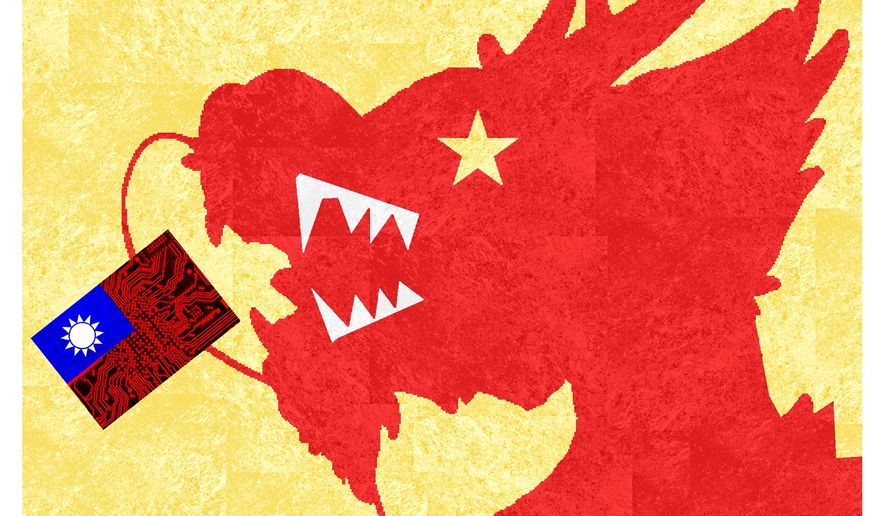OPINION:
Will Americans be embroiled in another war? With the Russian war on Ukraine, many experts are now predicting Taiwan is doomed to fall to the Chinese Communist Party.
But it’s not that simple.
Bradley Thayer, Founding Member of the Committee on Present Danger: China told me, “Taiwan is in some respects a linchpin, economic linchpin, militarily it is a linchpin, and in the ideological struggle against the Chinese regime, it is as well.”
Let’s look at those three areas.
On the economic front, Taiwan produces nearly 90% of the world’s high-end semiconductors, also known as microchips.
These chips are found in everything from phones, cars, computers, AC units, even military gear like fighter jets. If Taiwan were to fall to China, there would be a massive disruption across the supply chain. Even without a war, there already is.
I spoke with Keith Krach, former undersecretary of state, who said semiconductors are “literally the base of everything. It’s the most important industry in the world.”
Now semiconductors aside, let’s consider the second factor: Taiwan’s role as a strategic player.
Taiwan is part of what’s known as the First Island Chain, which stretches from Japan to Taiwan to the Philippines. If Taiwan were no longer free, the Chinese regime would be able to break through that First Island Chain and access the Pacific Ocean.
Now the reason that would be perilous is first, the Pacific Ocean has deep enough waters that China’s nuclear-armed submarines would be able to bypass U.S. detection and launch a surprise assault on U.S. shores.
Right now, the U.S. is able to track China’s submarines and stop them, were they to try and launch an assault.
Second, if Taiwan were to fall, the neighboring countries would rush to strike a deal with China in order to preserve their own safety as much as possible. That would mean a massive loss in allies to the U.S. in that region.
Now, when it comes to the question of whether America would defend Taiwan, the issue of “strategic ambiguity” comes up. Under that, the U.S. just has to make sure Taiwan has the means to defend itself. Hence the increase in arms sales to Taiwan.
But “strategic ambiguity” creates an aura of uncertainty. And what the Ukraine war has pushed to the forefront is the need for deterrence from strength. Not deterrence through uncertainty. And before we get into the third, and arguably the most important factor when it comes to Taiwan, let’s take a moment to see what the Russian war on Ukraine has taught us.
That war has taught Beijing and Taiwan lessons, both good and bad for each side. The resilience seen in Ukraine is a good indicator for Taiwan’s spirit to fight and defend its freedoms if the Chinese regime were to launch an invasion.
In war, there is the weighing of odds.
If it’s just Beijing vs. Taiwan, those odds are looking pretty good for the Chinese regime. But if it’s Beijing vs. Taiwan and Japan and Australia backed by U.S. military might, suddenly those odds don’t look so good anymore.
But all that aside, there’s a third factor, maybe the most important one, when it comes to Taiwan.
Keith Krach told me, “There will always be a need to defend Taiwan. And the reason is, they are a role model of democracy in that region.”
“They also dispel Xi [Jinping’s] myth that the Chinese culture cannot survive a democracy and it needs an authoritarian government,” he added.
And because of that, the Chinese communist regime will forever see a free Taiwan as a thorn in its side and try to squash it. Obliterate it.
But more than trade and military might, what the Chinese regime fears most is Taiwan’s ideological threat. That threat stems from freedom, whether that’s freedom of religion, of the press, or equality before the law; in other words, the bastions of Democracy.
The Chinese regime is afraid of those freedoms, as that would allow the Chinese people to rise up against authoritarian rule, a rule of fear.
In fact, Taiwan showcases a second China. One not ruled by an iron fist of fear.
But if Beijing were to snuff out Taiwan, it’s not just the ideological front. It’s not just the loss of a Democratic ally, albeit an unofficial one.
It would be the loss of life, as we know it.
World economies would be askew and there would be a major shift in world powers. If America loses the Pacific power, it will mark the end to America’s position as the leader of the free world.
• Tiffany Meier is a broadcast journalist covering China news. She is the host of “China in Focus” on NTD, which was one of the first platforms to offer in-depth coverage on the pandemic coming out of Wuhan.




Please read our comment policy before commenting.